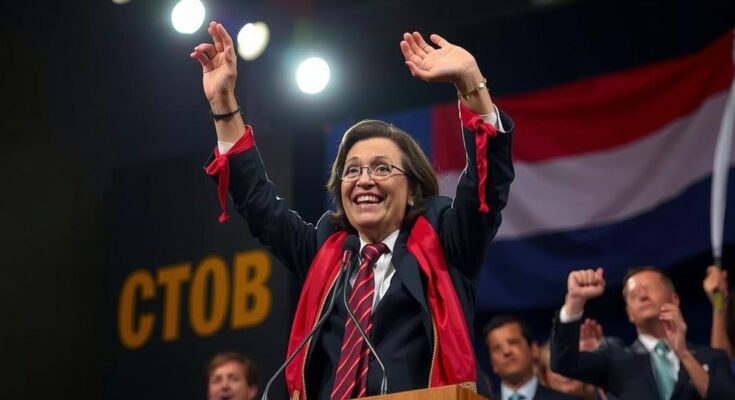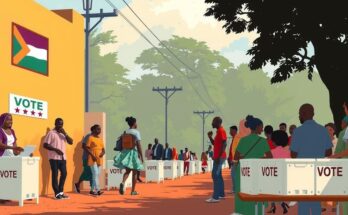Yamandu Orsi, representing the left-wing Broad Front, won Uruguay’s presidential election by securing 49.8% of the votes against Alvaro Delgado of the National Party, who garnered 45.9%. With nearly 90% voter turnout, Orsi’s victory is seen as a rebirth of leftist governance after the center-right’s recent control. Current President Luis Lacalle Pou acknowledged the result and pledged a smooth transition to the new administration.
In a significant political shift, left-wing candidate Yamandu Orsi has emerged victorious in Uruguay’s presidential election, defeating the incumbent center-right National Party candidate Alvaro Delgado. Following a second round of voting, official results indicate that Orsi secured 49.8% of the votes compared to Delgado’s 45.9%, with a turnout of nearly 90% among the nation’s 3.5 million populace. Orsi’s victory reflects a potential return to power for the left-wing Broad Front coalition, which previously held office for 15 years until 2019 when the National Party assumed control.
In his victory address, Orsi stated, “The country of liberty, equality and fraternity has triumphed once again,” emphasizing the necessity for unity among all citizens, regardless of political affiliations. He recognized the feelings of those who supported his opponent, asserting the importance of their involvement in the nation’s progress.
Alvaro Delgado, upon conceding the election, expressed his sentiments of melancholy but acknowledged the electoral outcome with grace: “With sadness, but without guilt, we can congratulate the winner.” Current President Luis Lacalle Pou has assured a smooth transition, announcing his readiness to collaborate with Orsi. He conveyed his congratulations through a message on social media, signaling a commitment to a seamless transfer of power.
Yamandu Orsi, a former history teacher and mayor of Montevideo, is widely regarded as an intellectual successor to former President Jose Mujica, noted for his austere lifestyle and progressive reforms. Amid various pressing issues such as stagnant economic growth and rising crime rates, Orsi’s election may signify a return to policies aimed at addressing these challenges, which were instrumental in shaping voters’ preferences this election cycle.
The political landscape of Uruguay has undergone a notable transformation with the recent presidential election, which saw a left-wing candidate reclaim power after a period of center-right governance. Historically, the Broad Front coalition dominated Uruguayan politics for 15 years before being replaced by the National Party in 2019. The election reflects an electorate grappling with economic difficulties and social concerns, highlighting the importance of political responsiveness in addressing voter needs. Yamandu Orsi’s ascension serves not only as a reflection of public sentiment but also as a potential reversion to policies focused on social equality and government accountability, paralleling the governance style of former President Jose Mujica.
The recent election of Yamandu Orsi as Uruguay’s president marks a significant realignment in the country’s political landscape, suggesting a renewed commitment to leftist policies addressing economic and social issues. His victory, characterized by a call for unity among citizens, foreshadows a leadership style reminiscent of former President Mujica’s approach. With a decisive win, Orsi’s presidency may usher in changes aimed at revitalizing Uruguay’s economy and ensuring social equity, which will be crucial in the context of ongoing challenges facing the nation.
Original Source: www.dw.com




